Israeli developer set to launch women’s safety app in London
The creators of SafeUP, used by thousands of women in Israel on late-night walks home, will bring the service to London after Sarah Everard's tragic death
Michael Daventry is Jewish News’s foreign and broadcast editor

Neta Schreiber vividly remembers the moment a decade ago when she came across one of her friends being forcibly restrained by two men in a confined space.
It was at a house party in Israel and the friend had been missing for a while, prompting an increasingly frantic search for her around the building.
“We looked all around the house for her,” Schreiber told the Jewish News in a video call from Israel, “and eventually we found her in a cupboard struggling against two men.”
It was an attempted sex assault. The two men ran away the moment they were discovered.
The incident inspired her to help women seek assistance or protection whenever they feel vulnerable — such as during a late-night walk home through the dark streets of a city.
That is a scenario carries strong parallels with the case of Sarah Everard, whose body was found in woodland outside London last week. She was last seen walking alone through the city’s streets at night.
Schreiber’s experience led her to create SafeUP, a smartphone app and community safety network in which women protect each other.
At the press of a button, users can send their location to other women volunteers — the app calls them “guardians” — who are geographically close to them.
Schreiber says the principle was similar to the cab hailing app Uber: “There are a lot of guardians in every place and if I need help, I click on a button and the algorithm finds the nearest guardian that is available.”
It creates a video call with up to four guardians who provide reassurance to the woman if she feels unsafe — because she is being followed down a street, for example.
The experience of the app in Israel is this can be enough to help: many women said the men following them would stop as soon as the call began.

“When you speak with someone who is really close to you and you know that she can walk to you if you just [asked] her, you just feel safer,” Schreiber says.
“In 95% of the case it [the incident] will be resolved online, but there are some cases when the guardians come physically to help.”
Sometimes the volunteers come out to join women on nearby streets and escort them home.
In one case, an elderly woman raised the alarm after her son began to attack her — and the call was picked up by a guardian who was living in the same building.
“She reached the door and immediately when she knocked on the door and entered, her son ran away, and they called the police,” Schreiber says.
The app is not yet a “perfect” solution for domestic violence cases, she admitted, but it has proved to be a valuable resource for women in Israel when they feel unsafe outside. In this five months since it launched in the country, it has attracted 16,000 users and a network of guardians in place in every city.
SafeUP works in other countries too, but the development of guardian networks is patchy for the moment. The plan now is to expand to several cities in the United States — and possibly London, where a small community already exists.
As it’s free to download and use, the inevitable question is: how will the app pay for itself?
Schreiber says two years of growth in markets in the US and Europe will help them build a map of local women’s sense of safety.
That data will be immensely useful to local authorities like councils and the police, and for local businesses too.
“If you just think about that, we will give to every property in London, in the US, a safety score. And then a company like Airbnb or Booking.com, they want that safety score to give to their users,” she says.
“If one area is a six and another area is nine, they will want to know how to fix that situation, to be proactive and to prevent sexual harassment.
“In that way we make the street and the city more safe.”
Expansion to other countries will come with challenges, involving the recruitment of managers who know their areas and can oversee teams of guardians preparing to help women in the area.
But the tragic death of Sarah Everard has accelerated plans to expand in the UK.
“We are going to put a lot of focus in the next few weeks to grow our community in London and bring every woman the sense of safety and the ability to feel safe and be safe wherever she goes,” Schreiber says.
She calls it “a movement of women who want to create a change and to create a safe place for women for every place in the world.
“We invite all women to join us.”

Thank you for helping to make Jewish News the leading source of news and opinion for the UK Jewish community. Today we're asking for your invaluable help to continue putting our community first in everything we do.
For as little as £5 a month you can help sustain the vital work we do in celebrating and standing up for Jewish life in Britain.
Jewish News holds our community together and keeps us connected. Like a synagogue, it’s where people turn to feel part of something bigger. It also proudly shows the rest of Britain the vibrancy and rich culture of modern Jewish life.
You can make a quick and easy one-off or monthly contribution of £5, £10, £20 or any other sum you’re comfortable with.
100% of your donation will help us continue celebrating our community, in all its dynamic diversity...
Engaging
Being a community platform means so much more than producing a newspaper and website. One of our proudest roles is media partnering with our invaluable charities to amplify the outstanding work they do to help us all.
Celebrating
There’s no shortage of oys in the world but Jewish News takes every opportunity to celebrate the joys too, through projects like Night of Heroes, 40 Under 40 and other compelling countdowns that make the community kvell with pride.
Pioneering
In the first collaboration between media outlets from different faiths, Jewish News worked with British Muslim TV and Church Times to produce a list of young activists leading the way on interfaith understanding.
Campaigning
Royal Mail issued a stamp honouring Holocaust hero Sir Nicholas Winton after a Jewish News campaign attracted more than 100,000 backers. Jewish Newsalso produces special editions of the paper highlighting pressing issues including mental health and Holocaust remembrance.
Easy access
In an age when news is readily accessible, Jewish News provides high-quality content free online and offline, removing any financial barriers to connecting people.
Voice of our community to wider society
The Jewish News team regularly appears on TV, radio and on the pages of the national press to comment on stories about the Jewish community. Easy access to the paper on the streets of London also means Jewish News provides an invaluable window into the community for the country at large.
We hope you agree all this is worth preserving.





















